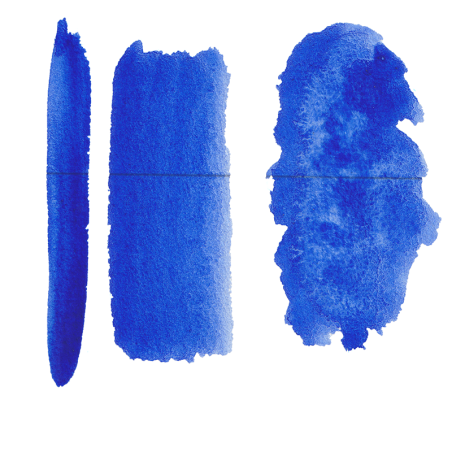















Ultramarine Blue - Between History and Modernity
PB29 - Semi-transparent - Granulating
Ultramarine Blue is a deep, rich hue, valued for its intense vibrancy and its ability to capture light, making it ideal for skies, oceans, and delicate shadows.Very useful for composing magnificent mauves, especially with quinacridones like Isaro pink for example. With black or burnt sienna, it makes it possible to obtain very beautiful Payne grays and with burnt umber to create a beautiful indigo.
100% MADE IN BELGIUM
We calculate shipping costs as fairly and accurately as possible
We’re here to answer your questions
Ultramarine Blue, historically derived from lapis lazuli, is a pigment with a rich history. Used since the Middle Ages for illuminated manuscripts and frescoes, its cost decreased with the synthesis of artificial ultramarine in the 19th century. In watercolor, ultramarine blue stands out for its depth and transparency. It offers a vibrant intensity ideal for depicting clear skies, cool shadows, and seascapes. Its excellent permanence ensures that your works will stand the test of time.
For natural greens, combine it with Yellow Ochre or Saffron Yellow to create foliage. For deep purples, mix it with Isaro Rose or Magenta. For atmospheric greys, blend it with Van Dyck Brown or Burnt Umber.
Ultramarine Blue is also perfect for subtle gradients and glazes. It’s a versatile pigment that deserves a central place in any watercolorist's palette.
Data sheet
| Reference | A06 |
|---|---|
| Pigment: | PB29 |
| Mono-pigmented: | Yes |
| Granulation: | Granular |
| Opacity: | Semi-transparent |
| Tint power: | High |
| Pigment family: | Synthetic mineral pigment |
| Binder: | Distilled water, gum arabic, honey, vegetal glycerine |
| Cotation - Blue lightfastness scale: | 8 |
| Lightfastness: | Good |
| Percentage of méthylisothiazolinone (preserservative): | between 0,1 and 0,7% |
| Colors | Blue |